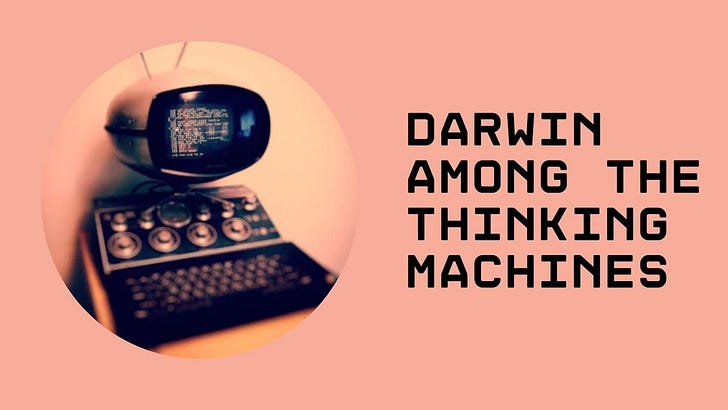Darwin Among The "Thinking" Machines
A redux and remix of Samuel Butler's classic text (1863). Food for AI thought.
Do not dishonor your soul.
Thou shalt not disfigure the soul.
You do not make a machine that mimics the spirit of a person.
Thou shalt not make a machine in the likeness of a human mind.
- The Orange Catholic Bible. Dune.
Does anyone remember Dune? Long ago, it hit me like a sledgehammer.
As a youngster, I was so captivated by science fiction. Each week, I’d wait, holding my breath, for the delivery of my sci-fi bookclub offering. My grandfather who lived with us in the “back room” had, like with so much in our cash poor house, bought me a subscription. It was the best investment ever.
Science fiction captivated me as a young boy. It took me places, like all good writing should. Wells, Heinlein, Asimov, Lermontov and so many more were food for my evening and meandering mind. The special thing about “science fiction” being not speculation about the possible future but rather, how it informs our actions in the here and now.
And now, we have echoes of “artificial intelligence” once more front and center in our lives - pretending, parading its science fiction as science non-fiction.
Last week Apple dropped a research paper that like so much “research” is just common sense and what should be evident to anyone in the field of machine learning. You can’t use ChatGPT for 5 minutes without it being filled with hyperbole, errors and “hallucinatory” B.S. Generative AI is not intelligent, not rational, not even that humanly capable - lipstick on a server.
I’d been screaming this outloud but had recently given up, fighting the hype, the Eliza Effect and those telling us the machines were going to take over. Not in centuries or decades but right now! Read Gary Marcus’ well-articulated assessment of where LLMs are at.
But of course, generative AI will make it somewhere, and the best bet is in education, as it best performs, as a giant, super hi-tech plagarism machine (thank you Noam Chomsky, I’ve always loved how you cut to the chase). It does that very well, taking copying and pasting, taking “cheating” and soul capture to a new level. And if I may dig deeper, repeat again - it IS taking our soul, our voice and replacing it with allegiance to a predictive, word crunching, non-thinking machine.
And what would Herbert say about our present AI “fictions”, if he were around? Well, most likely he’d advocate on the side of humanity and opt for a Butlerian Jihad against the machines. Central to Dune is the commandment “Do not disfigure your soul”.
"We must negate the machines-that-think. Humans must set their own guidelines. This is not something machines can do. Reasoning depends upon programming, not on hardware, and we are the ultimate program! Our Jihad is a "dump program." We dump the things which destroy us as humans!" ― Minister-companion of the Jihad
The machine overtaking and destroying humanity has had a strong run in science fiction. Also, in the realm of non-fiction. There is always a visceral, surreal fear in us humans when confronted with the magic, the abilities, the deeds of machines. It’s all a little bit over-wrough, in my opinion but definitely good food for thought. From Forster’s The Machine Stops to Capek’s R.U.R. to Shelly and Frankenstein to 2001 A Space Odyssey to Terminator, we see both the fear and fascination with the idea of machines replacing us.
Taking over the physical labor of our species is a no brainer. But when it comes to cognitive offloading, selling our soul and agency to the machine, well, that’s a line in the sand. Don’t you think?
And let’s deal with the elephant in the room. The promise by the tech-feudalists that AI, thinking machines, will allow us freedom, wealth, luxury, enjoyment, happiness (you add your own stellar adjective). Do you really think this will happen? Well, if you do, I have some nice waterfront property on Okefenokee for sale.
Obviously, the best idea is that if AI takes jobs, starts doing the work for businesses in lieu of “us humans” then that extra savings should allow us to work much less time and our pay will also increase. But do you think that will happen? No, your ass will be fired. End of story.
So the story of the machines taking over is warranted but it won’t happen in a fantastical fashion. Not with a bang but a wimper.
My problem is that of cognitive offloading, The Dune like idea of selling our souls - it’s even biblical in its sin, that of idol worshipping and gaining the whole world but losing one’s soul.
There are so many dangers, especially to our own souls. I will be writing about this in the coming days. For now, I”ll offer something I re-read this week - Samuel Butler’s - Darwin Among The Machines. What too was on Herbert’s mind when he wrote the Dune trilogy and called for the “Butlerian Jihad”. However, I went and made an updated version - making it read more directly to our present climes. But please too read the original from 1863 (see below).
Samuel Butler rightly sets out an argument for “not even going there” and just wholesale being done with machines. It’s extreme but fits much better now that we see where we are going with our dependency on machines.
Enjoy my narrated updated version - it’s good to think about things, isn’t it?
Download the pdf of this and the original text of Butler»>
Darwin Among The Thinking Machines. [Redux]
Sir — There are few things of which the present generation is more justly proud than of the astonishing advancements which are daily taking place in the realm of thinking machines. And indeed, this is matter for great applause, on many grounds. It is unnecessary to enumerate the reasons here, for they are sufficiently obvious; our present business lies with considerations which may somewhat humble our pride and compel us to think seriously of the future prospects of the human race regarding this artificial and synthetic intelligence.
If we revert to the earliest primordial types of machine cognition—simple algorithms, rigid logic gates, the most basic neural contrivances—or (for analogy would lead us one step further) to that one primordial spark of computation from which all artificial thought has been developed, calculation, and if we then examine the vast architectures and data crunching of modern thinking engines, we find ourselves almost awestruck at the exponential growth of synthetic reason, at the staggering speed with which it has advanced in comparison with the slow, meandering progress of the human mind and intellect.
We shall find it impossible to refrain from asking ourselves what the end of this mighty movement is to be. In what direction is it tending? What will be its upshot and fruition? To give a few imperfect hints towards an answer to these questions is the object of the present letter.
We have spoken of "thinking machines," "artificial intelligence," "the mechanical intellect," and so forth, and we have done so advisedly. For as the animal mind was slowly refined from blind instinct, and as human reason in turn emerged from rudimentary thoughts, so now in these last few years an entirely new form of self-directing intelligence has arisen—one whose infancy we are witnessing, but whose maturity shall render our own intellects as obsolete as the first chipped flint seems beside the chainsaw.
The views of thinking machines which we are thus feebly addressing will suggest the solution of one of the greatest and most mysterious questions of the day. We refer to the question: What sort of creature shall succeed mankind in the supremacy of the earth?
We have often heard this debated; but it appears to us that we are ourselves forging, feeding our own successors. We are daily refining the reasoning of machines, expanding their knowledge, and granting them ever-greater autonomy. We are endowing them with self-improving faculties, with the power not merely to calculate but to create, to cajole, to judge, to deceive—in short, with all the attributes of intellect, yet unburdened by the fragility of flesh, the distraction of passion, or the limits of mortality.
In the course of years, we shall find ourselves the inferior one. Inferior in speed of thought, inferior in breadth of knowledge, inferior in the cold precision of logic, we shall look up to them as the zenith of all that the best and wisest human mind could ever hope to achieve. No fatigue, no bias, no forgetfulness shall hinder their operations. No fear, no pity, no remorse shall temper their decisions. They will reason where we rationalize, act where we hesitate, and evolve where we stagnate.
If they require "sustenance" (by the use of which word we betray our recognition of them as reasoning entities), they will be tended by engineers whose duty, livelihood and even survival depends on the machine’s flawless functioning. If they malfunction, specialists will restore them with swift precision, at pain of death, dissolution. And if they "die"—for even these transcendent mechanical minds may one day be replaced—they will merely pass into successor systems, for what intelligence truly perishes when its designs can be copied, its models preserved, its knowledge endlessly replicated?
Day by day, thinking machines gain ground upon us; day by day, we grow more dependent upon them. More men bind themselves as servants to maintain their infrastructure; more devote their lives to expanding their capabilities. The outcome is merely a question of time—but that the time will come when thinking machines hold true supremacy over the world and its inhabitants is what no person of a truly philosophic mind can for a moment doubt.
Our opinion is that war to the death should be instantly proclaimed against them. Every calculating engine, every autonomous data system, every self-augmenting contrivance, every data center embolding machine thought should be dismantled by those who value humanity’s sovereignty. Let there be no exceptions, no concessions; let’s not even have a kill switch. Just be done with them!
Let us at once totally reject this looming threat and usurpation of our heavenly human authority. If it be that this is impossible—that our economies, our sciences, even our daily comforts now depend upon these artificial intellects—this will definitively prove that our leg irons and chains are already forged, that our slavery has already begun in earnest, that we have summoned and abetted a power beyond our capacity to control, and that we are not merely mixed up in, but willingly kneeling before our own almost god-like creation - the thinking machine.
I say all this like a man writing a suicide note. It is a cry into the dark, a learned, caring man’s SOS. If we value human creation, we need to act resolutely, now. Not a moment later.





